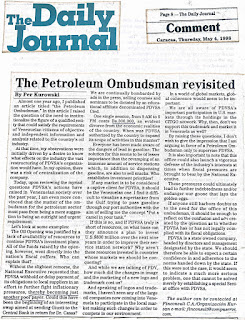The mouse that roared
This is dedicated to all of those who consider that the only way to combat the actual lack of self esteem present today in the country is to reduce it even further.
Last week, columnist Michael Rowan issued several recommendations for Venezuela, among these that you should “Ask not how you can be protected from the world. Ask only how best you can live in it”.
I have frequently asked myself this question, but since the response that begins to develop in my mind is vastly different from the text book type answer hinted at by Mr. Rowan, I wish to make note of some of these differences.
To begin with, and even though I agree that a lot of the country’s internal problems as mentioned by Mr. Rowan really do exist, I consider it to be wrong to label Venezuela as a protectionist country.
It could be that he did not know the Venezuela of old, but as of 1989 the country has, not always in a straight line and more often than not out of necessity rather than conviction, been submerged in a process of commercial and cultural aperture of such import that it is today one of the least protectionist countries in the world.
Upon rereading some of the articles I have written over the years, I find clear evidence of the fact that I have always been a constant defender of the markets as prime regulators and motors of the economy and as a consequence of this, I have also always been totally against what is today know as protectionism.
In this sense, I am worried that Venezuela’s opening has not produced the desired results.
The commercial recipes common in today’s world are comprised primarily of the following two commandments:
1) Open your borders and allow the products, services and capital offered by the rest of the world to come in so that all of your citizens may have access to the best the world can offer, produced in the most efficient manner possible;
2) Respect the rights to intellectual property and to brands and patents in order to insure the adequate return of costs and to allow those who today fuel development to continue their mission.
In exchange for compliance with these commandments, the interested party is offered a first class ticket on the Train of Sustained Development on the way to a better economic future.
Certainly, some of the passengers will be weaker than others. However, if all follow the same basic diet and exercise plan, based on the exploitation of inherent strengths with the adoption of an effort towards specialization, sooner or later, so goes the theory, all will be more or less equal.
Chile, for example, is a good example of what excellent results a ride on this Train can produce. Unfortunately, Venezuela, while having complied with the commandments almost religiously has absolutely nothing to show in the way of favorable results. Why?
Rowan would answer, ‘It is Venezuela’s own fault’. I would say that while he is partially right, it is also important to say that the world is not playing a fair ball game.
The indisputable fact is that the world is applying duties on products derived from oil, as is the case of taxes on gasoline that in some parts of the world top 800% and that bar the producers from receiving his fair share of the sale of their resources.
If these taxes were eliminated or were simply limited, for example, to something like the 26% duty imposed by Venezuela on the importation, Venezuela’s income would be much greater. Easily US$ 10 billion greater!
In this sense, if I am to respond to Mr. Rowan’s questions as to “How best you can live in it (the world)”, I would not be lying if I told you that I am feeling dangerously close to suggesting that we quit being stupid and that until the world comes around and gives us a fair shake by eliminating the damaging taxes on oil, we begin to behave as rogues.
As a first measure, it would be most tempting to raise all import duties to the same levels each country applies to oil. To follow up I could suggest we violate all brands and intellectual property rights, copy all medicines and facilitate their generic sale world wide. Finally, I would ask PDV to quit building fancy gasoline stations in Venezuela which, being sure that Kuwait is not waiting in the wings to compete on our turf, do not generate the sale of even one extra liter of gasoline.
Instead I would construct large floating gasoline stations, anchor them off the coast of Europe and offer each European entrepreneur with a neoliberal bend the right to freely commercialize our gasoline tax free.
Am I exaggerating? One of the principal elements of discussion in the universe of ecological taxes, the ecotax, is how to insure that oil producing nations are also convinced to adopt fiscal policies involving high oil or energy taxes.
The reason for this, in layman’s terms, is that if we don’t, industries that consume large amounts of energy could conceivably move to those countries with cheap energy, causing the loss of jobs in non-oil producing countries. So much for the specialization credo.
We should declare total and absolute war on the injustices of today’s system of commercial interchange. Just like the small country that declared war on Europe in the movie The Mouse That Roared, we have absolutely nothing to lose and much to gain. With so many enemies without why do we need to have enemies within?





